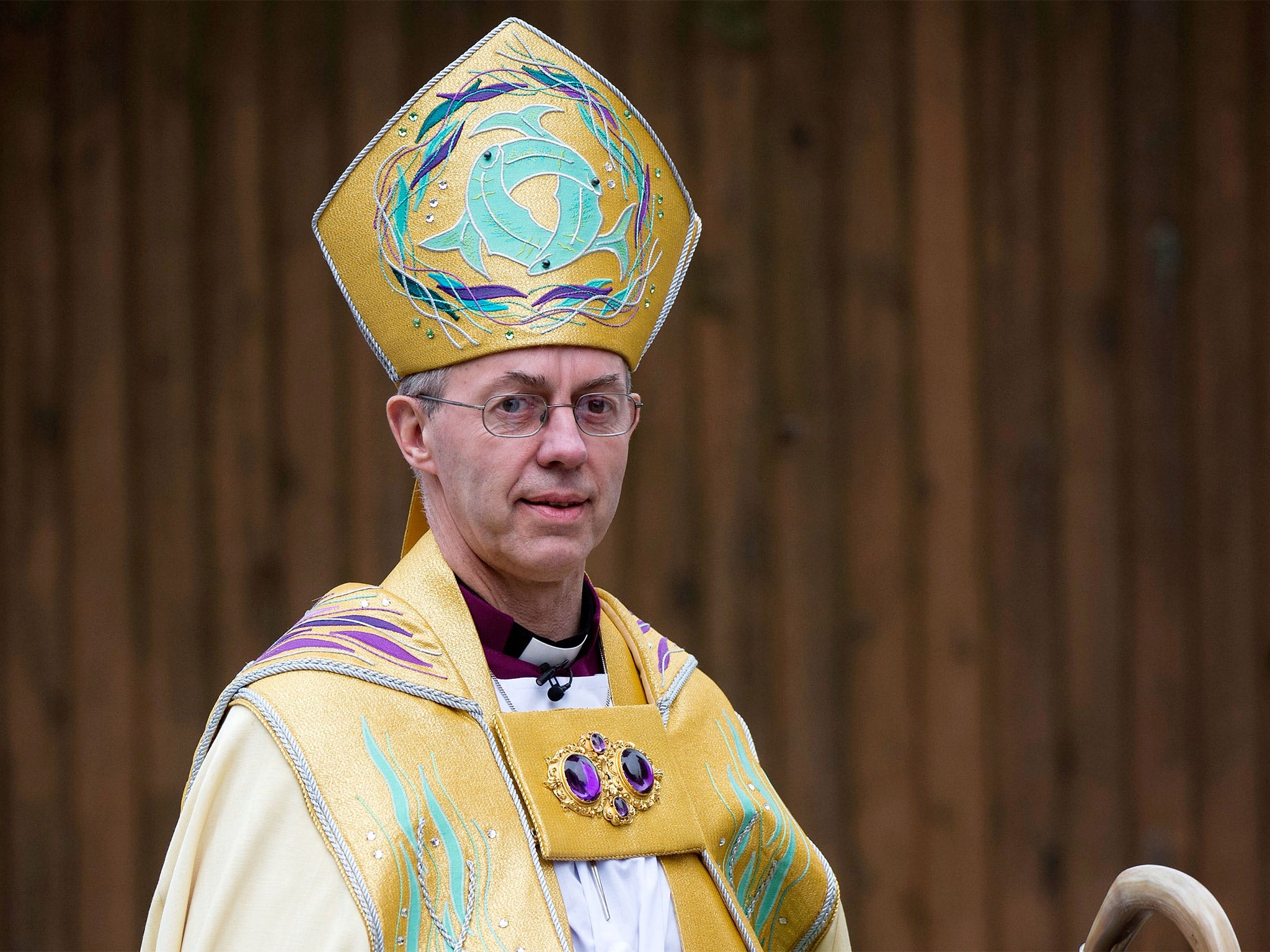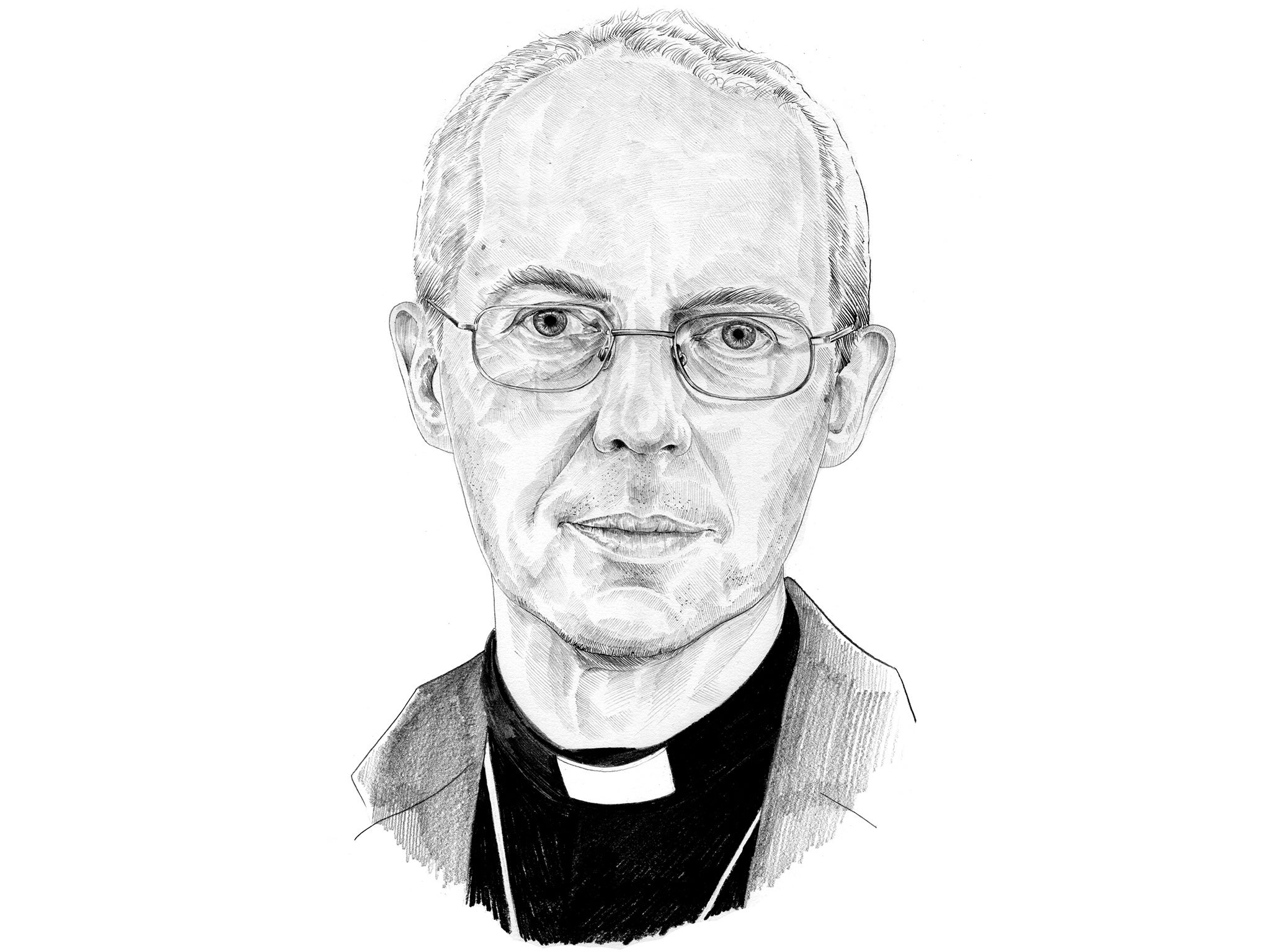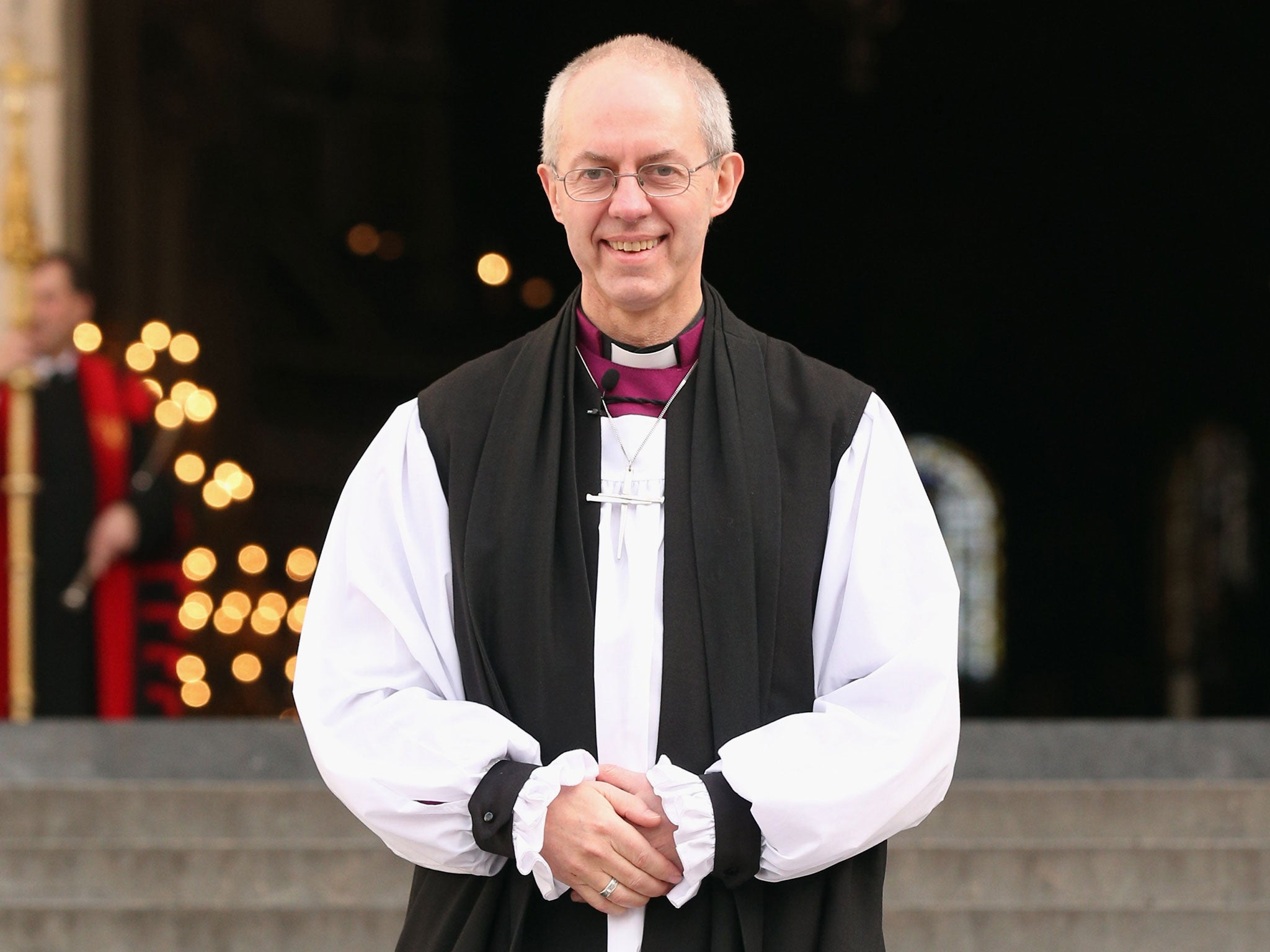Justin Welby: The nation's conscience
Two years ago the CofE enthroned a relative newcomer as Archbishop of Canterbury. Its faith has been rewarded, says Peter Stanford

Your support helps us to tell the story
From reproductive rights to climate change to Big Tech, The Independent is on the ground when the story is developing. Whether it's investigating the financials of Elon Musk's pro-Trump PAC or producing our latest documentary, 'The A Word', which shines a light on the American women fighting for reproductive rights, we know how important it is to parse out the facts from the messaging.
At such a critical moment in US history, we need reporters on the ground. Your donation allows us to keep sending journalists to speak to both sides of the story.
The Independent is trusted by Americans across the entire political spectrum. And unlike many other quality news outlets, we choose not to lock Americans out of our reporting and analysis with paywalls. We believe quality journalism should be available to everyone, paid for by those who can afford it.
Your support makes all the difference.There must be a quiet satisfaction right now in the upper echelons of the Church of England.
Two years ago, it took a leap in the dark by passing over all the obvious candidates for Archbishop of Canterbury and chose instead the rank outsider, Justin Welby.
His was a late vocation and he hadn’t even been a diocesan bishop for a year, but the church was so desperate to find someone fresh who might just extricate Anglicanism from its seemingly interminable internal squabbles over women bishops and gay priests that it took a huge gamble on an unknown quantity. And how handsomely this old Etonian, former oil executive and father of six has repaid its faith.
On Welby’s watch – he celebrates the second anniversary of his installation next month – the women bishops’ row that had dragged on for years in General Synod, making the CofE look hopelessly irrelevant in the real world, is now comprehensively settled. When the Rev Libby Lane was installed as Bishop of Stockport last month, there was just one lone voice of protest in York Minster. And the once overheated battle over whether vicars could live with their same-sex partners has been consigned to a back burner.

Today, Welby leads a church that is once again making headlines for its willingness to stand up and be counted in the public square. First, the Archbishop of Canterbury joined forces last month with the man he pipped for the top job, Archbishop John Sentamu of York, to publish a book of essays, On Rock or Sand?, which attacks the Coalition Government in forceful language for policies that are “casting aside” whole parts of the country and allowing a widening gap between rich and poor to make Britain a nation “ill at ease with itself”.
And now this week, Welby and the entire House of Bishops have produced a 52-page letter, addressed to Anglicans, offering for the first time guidance on the issues they ought to weigh when voting in the general election. It’s all a far cry from the old adage that the Church of England is “the Tory Party at prayer”.
Indeed, its description of the country as a place where the “poor and vulnerable” are “unwanted, unvalued and unnoticed”, and its demand for a change in the “political weather” as “decisive” as that of 1945 or 1979, have so outraged Conservative MPs that they have been queuing up to damn the letter’s authors as “naive” and “left-leaning”.
The last time the Anglican bishops so unambiguously and unapologetically spoke truth to power was under Welby’s predecessor but two, Robert Runcie. Faith in the City, his excoriating 1985 verdict on Thatcherism, prompted such a backlash at Westminster that subsequent Anglican leaders retreated for a generation from similar root-and-branch assaults on politicians. But those who know Welby well say that, this time round, he will not so easily be cowed into silence now that he seems finally to have wrested the church on to an agenda where he believes it is morally strong and authoritative.
This troublesome priest can speak out so fearlessly on issues of social division and deprivation partly as a result of Faith in the City. Inspired by it, the CofE has, over the past 30 years, built a formidable and unique presence in marginalised communities on sink estates.
Just as important, though, in propelling Welby into the national spotlight is the character of the 105th Archbishop of Canterbury. He is at his best as a strategist, with skills he honed in his business career. He is revered among his clerical colleagues for his planning, his purposefulness and his strict avoidance of the sort of loose talk that undermined predecessors at Lambeth Palace. Apart from a single slip, when he attacked the payday loans company Wonga, only to be told the Church Commissioners had invested in it, he has not put a foot wrong in public.

For all his commitment to championing the poor and oppressed, Welby was born, in London, into privilege on 6 January 1956. His mother, Jane, was a relative of the Tory grandee Rab Butler, and had been a personal secretary to Winston Churchill. She once took her young son to tea with the retired Prime Minister.
His father, Gavin, seemed at first glance to be cut from the same cloth but, after divorcing Welby’s mother when their son was three, this wealthy businessman became increasingly erratic as his financial dealings unravelled and alcoholism took hold. Welby was later to recall spending much of his teenage years in a series of rented flats living alone with his father, caring for him after a stroke, and even having to do the occasional midnight flit when they couldn’t pay the rent. A ruined Gavin Welby died when his son was 21.
There had still been sufficient funds to send Justin to Eton, though for some of his later terms the fees had to be waived. It was, the future archbishop recalled, a “horrible” way to spend his youth. It was at Trinity College, Cambridge, that he first had a profound experience of God, and considered pursuing a vocation when he graduated in 1978. Instead, he spent 11 years working in the oil industry, including a long spell in Paris.
He had met his wife Caroline as a student. Both were committed Anglicans. Their first child, Johanna, was killed at seven months in 1983 in a car crash in France. Her death, he has said, brought him “closer to God”.
Back in London, they attended Holy Trinity, Brompton, the church that invented the Alpha Course as an evangelical approach to Anglicanism which helped many of its well-heeled young parishioners to find God. In 1989, Welby decided he could no longer ignore his vocation, threw in his job and trained for the priesthood. It was a major life change, spiritually as well as economically.
He rose rapidly. His first parishes were in and around the Midlands. In 2002, he joined Coventry Cathedral’s International Centre for Reconciliation and got involved in pioneering and often hair-raising work in conflict resolution in Nigeria and Iraq.

He never stayed in one job for long, and in 2007 was named Dean of Liverpool Cathedral. He was just getting settled there when, in 2011, he was appointed Bishop of Durham. This time, it was an even shorter stay before Canterbury and leadership of the Church of England beckoned.
The consensus in 2013 was that Canterbury was an un-doable job, but Welby has so far taken it in his stride. If he has a flaw, it is that he hasn’t translated what friends say is a warm, witty personality in private into his public ministry. While no one doubts his intelligence or his abilities, he can, as his recent appearance on Desert Island Discs demonstrated, come across as a bit of a cold fish. In response to Kirsty Young’s gentle questions, usually an open invitation for castaways to bare their soul and win round listeners, his answers and his choice of records sounded as if they had been scripted by advisers. In other words, he was behaving like politicians do when they find themselves in the same studio seat.
Perhaps his emotional reserve is the lingering scar of that unhappy childhood, or the legacy of a boarding school education. Whatever the reason, in comparison with the touchy-feely John Sentamu, or even the saintly monk, Rowan Williams, Welby can come across as grey, someone to admire rather than a leader to take to heart. However, with the church restored to its position as the nation’s social conscience, at least no one can accuse him of being an irrelevance.
Peter Stanford’s biography of Judas is published this Easter by Hodder
A life in brief
Born: 6 January 1956, London.
Family: Father Gavin was a businessman and his mother Jane a secretary. Married Caroline in 1979.
Education: Educated at Eton. History and law graduate from Trinity College, Cambridge. Theology degree from St John’s College, Durham.
Career: Joined French oil company Elf in 1978. Ordained in 1992. Elected Bishop of Durham in 2011. Enthroned Archbishop of Canterbury in March 2013.
Join our commenting forum
Join thought-provoking conversations, follow other Independent readers and see their replies
Comments